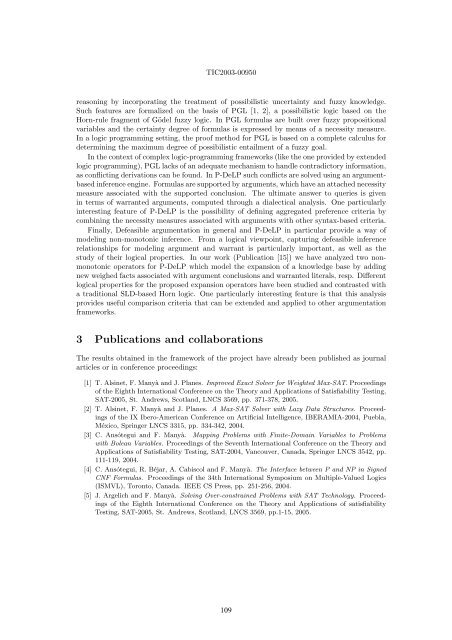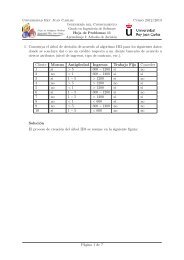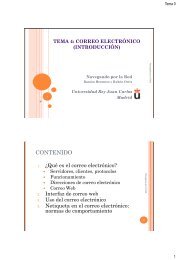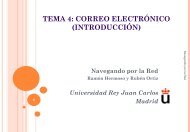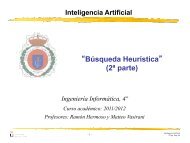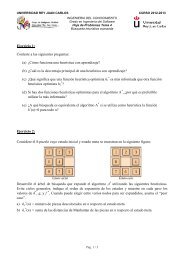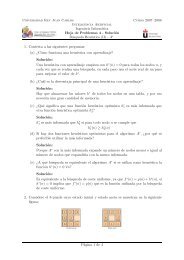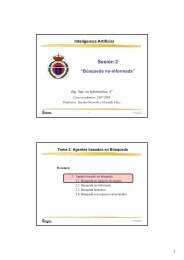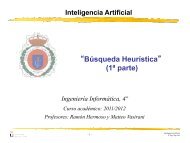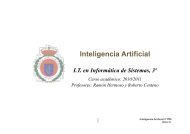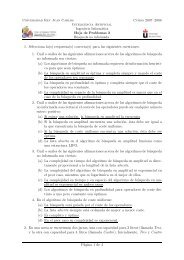GLIRS-II - Grupo de Inteligencia Artificial - Universidad Rey Juan ...
GLIRS-II - Grupo de Inteligencia Artificial - Universidad Rey Juan ...
GLIRS-II - Grupo de Inteligencia Artificial - Universidad Rey Juan ...
You also want an ePaper? Increase the reach of your titles
YUMPU automatically turns print PDFs into web optimized ePapers that Google loves.
TIC2003-00950<br />
reasoning by incorporating the treatment of possibilistic uncertainty and fuzzy knowledge.<br />
Such features are formalized on the basis of PGL [1, 2], a possibilistic logic based on the<br />
Horn-rule fragment of Gö<strong>de</strong>l fuzzy logic. In PGL formulas are built over fuzzy propositional<br />
variables and the certainty <strong>de</strong>gree of formulas is expressed by means of a necessity measure.<br />
In a logic programming setting, the proof method for PGL is based on a complete calculus for<br />
<strong>de</strong>termining the maximum <strong>de</strong>gree of possibilistic entailment of a fuzzy goal.<br />
In the context of complex logic-programming frameworks (like the one provi<strong>de</strong>d by exten<strong>de</strong>d<br />
logic programming), PGL lacks of an a<strong>de</strong>quate mechanism to handle contradictory information,<br />
as conflicting <strong>de</strong>rivations can be found. In P-DeLP such conflicts are solved using an argumentbased<br />
inference engine. Formulas are supported by arguments, which have an attached necessity<br />
measure associated with the supported conclusion. The ultimate answer to queries is given<br />
in terms of warranted arguments, computed through a dialectical analysis. One particularly<br />
interesting feature of P-DeLP is the possibility of <strong>de</strong>fining aggregated preference criteria by<br />
combining the necessity measures associated with arguments with other syntax-based criteria.<br />
Finally, Defeasible argumentation in general and P-DeLP in particular provi<strong>de</strong> a way of<br />
mo<strong>de</strong>ling non-monotonic inference. From a logical viewpoint, capturing <strong>de</strong>feasible inference<br />
relationships for mo<strong>de</strong>ling argument and warrant is particularly important, as well as the<br />
study of their logical properties. In our work (Publication [15]) we have analyzed two nonmonotonic<br />
operators for P-DeLP which mo<strong>de</strong>l the expansion of a knowledge base by adding<br />
new weighed facts associated with argument conclusions and warranted literals, resp. Different<br />
logical properties for the proposed expansion operators have been studied and contrasted with<br />
a traditional SLD-based Horn logic. One particularly interesting feature is that this analysis<br />
provi<strong>de</strong>s useful comparison criteria that can be exten<strong>de</strong>d and applied to other argumentation<br />
frameworks.<br />
3 Publications and collaborations<br />
The results obtained in the framework of the project have already been published as journal<br />
articles or in conference proceedings:<br />
[1] T. Alsinet, F. Manyà and J. Planes. Improved Exact Solver for Weighted Max-SAT. Proceedings<br />
of the Eighth International Conference on the Theory and Applications of Satisfiability Testing,<br />
SAT-2005, St. Andrews, Scotland, LNCS 3569, pp. 371-378, 2005.<br />
[2] T. Alsinet, F. Manyà and J. Planes. A Max-SAT Solver with Lazy Data Structures. Proceedings<br />
of the IX Ibero-American Conference on <strong>Artificial</strong> Intelligence, IBERAMIA-2004, Puebla,<br />
México, Springer LNCS 3315, pp. 334-342, 2004.<br />
[3] C. Ansótegui and F. Manyà. Mapping Problems with Finite-Domain Variables to Problems<br />
with Bolean Variables. Proceedings of the Seventh International Conference on the Theory and<br />
Applications of Satisfiability Testing, SAT-2004, Vancouver, Canada, Springer LNCS 3542, pp.<br />
111-119, 2004.<br />
[4] C. Ansótegui, R. Béjar, A. Cabiscol and F. Manyà. The Interface between P and NP in Signed<br />
CNF Formulas. Proceedings of the 34th International Symposium on Multiple-Valued Logics<br />
(ISMVL), Toronto, Canada. IEEE CS Press, pp. 251-256, 2004.<br />
[5] J. Argelich and F. Manyà. Solving Over-constrained Problems with SAT Technology. Proceedings<br />
of the Eighth International Conference on the Theory and Applications of satisfiability<br />
Testing, SAT-2005, St. Andrews, Scotland, LNCS 3569, pp.1-15, 2005.<br />
109


